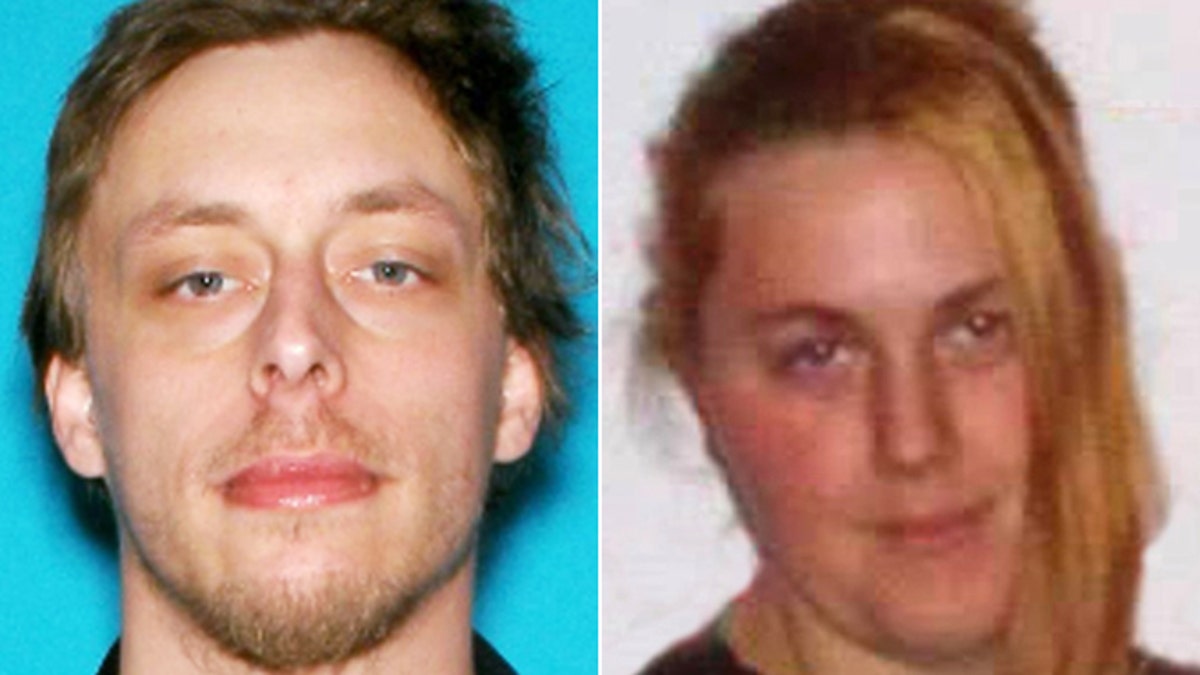
These undated photos provided by the Las Vegas Metropolitan Police Department show Jerad Miller and Amanda Miller. (AP/Las Vegas Metropolitan Police Department)
Authorities say the couple who gunned down two Las Vegas police officers and a bystander had prior run-ins with local law enforcement, but there was no indication that they intended to harm police.
“No indication [was] provided by the suspects of their anti-police feelings,” Las Vegas Metropolitan Police Department Assistant Sheriff Kevin McMahill said Wednesday about Jerad and Amanda Miller, who died by police gunfire and suicide, respectively, after the duo's deadly shooting spree.
According to McMahill, in one instance in February, the Southern Nevada Counterterrorism Center said it had obtained information that Jerad Miller threatened the Bureau of Motor Vehicles in his home state of Indiana. McMahill said Miller threatened to shoot anyone who showed up to arrest him for having a suspended driver’s license.
At the end of a phone call, Miller said, "If they come to arrest me for noncompliance or whatever, I'm just going to start shooting people," according to agency spokeswoman Danielle Dean.
But after being confronted by police, McMahill said Miller walked back his remarks and authorities found no probable cause for arrest at the time. The case was later closed.
In another case, Jerad Miller and his wife, Amanda, provided voluntary witness statements about a report of battery-domestic violence.
Prior to Sunday’s shootings, Jerad Miller took to YouTube and Facebook to broadcast his rhetoric.
"In this particular situation, I think we would all be kidding ourselves if we said the signs weren't there," said Detective Rob Finch, who advocates using social media to monitor extremists in his work with the Greensboro, N.C., police department. "There are thousands of people out there that voice these things on the Internet every day. YouTube is filled with them."
Jerad and Amanda Miller shot and killed two officers who were on their Sunday lunch break at a pizza parlor, then told patrons that they were starting a revolution, according to police. They went next to a nearby Walmart, where Amanda Miller killed a shopper who confronted her husband before police arrived.
After a gun battle inside the store, Jerad Miller was shot dead by police and Amanda Miller killed herself, McMahill said Wednesday.
While it would have been hard to pick Miller out of the sea of other extremists, he did make efforts to identify himself publicly during a spring standoff between supporters of southern Nevada rancher Cliven Bundy and federal agents who wanted to round up Bundy's cattle.
In an interview with a television reporter in April, Miller said he didn't want a violent confrontation, but "if that's the language they want to speak, we'll learn it."
Miller was kicked off the Bundy ranch after a few days because he made other protesters uncomfortable, according to Ryan Payne, who helped coordinate between the Bundy family and militia members who came to support them. The concerns: Miller was a felon in possession of a firearm; he made troubling statements Payne said he couldn't specifically recall but that departed from the movement's principle of "defense" of Bundy's ranch; and he was "just a little bit off."
Another militia leader gave the Millers a few hundred dollars — they said they sold everything to reach the ranch about 80 miles from Las Vegas — and they left.
"We had no inclination to believe that something like what happened would happen," Payne said.
Jerad Miller's television exposure could have caught the attention of authorities, said Mark Pitcavage, director of investigative research at the Anti-Defamation League, which tracks extremist groups.
"It is good practice for authorities to learn who these people are because these are people seemingly willing to get involved in an armed standoff," he said.
Even then, absent an overt criminal act, authorities would have been limited to a "knock and talk" conversation to see what threat Miller might pose. Federal guidelines restrict what kind of intelligence law enforcement can gather on suspected extremists, Pitcavage noted.
What's more, the U.S. government had until last week suspended a domestic terrorism task force. It disbanded following the Sept. 11, 2001, terrorist attacks, when the government's attention shifted to foreign militants.
Authorities would also have been limited in their response if the Millers' neighbors had called police, though apparently none was moved to do so.
At their apartment complex in a hardscrabble area of Las Vegas — where Miller would walk around in camouflage with a handgun visible on his hip — neighbors said Miller openly shared his hatred of police. But it wasn't clear that he intended to act.
"Jerad never directly told me he was going to go off and pop cops," said Drew Flory, who lived next door to the couple for about a month.
Meanwhile, at the Indiana home of Jerad Miller's mother, a sign on the door read: "We are profoundly saddened, confused and in shock over the senseless actions of our son and his wife."
The Associated Press contributed to this report.

